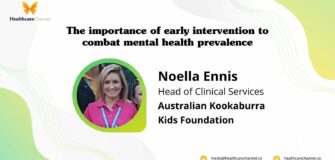Talking about Trauma with Blue Knot Foundation – Episode 4
Share
In an effort to shine a light on a topic often shrouded in silence and stigma, we are proud to present our exclusive interview series, “Talking about Trauma with Blue Knot Foundation.”
Millions of Australians live with disabilities, and many also face complex trauma stemming from abuse, neglect or exploitation. Specialist counselling can profoundly transform these individuals’ lives by fostering understanding, stability and empowerment.
Kiirti, a counsellor with the National Counselling and Referral Service, provides insights into delivering trauma-informed support to clients with disabilities.
In her own words, she reflects on the essence of her role: “My role is to provide trauma specialist counseling, be a listening ear, empower them through psychoeducation and referrals, and ultimately hold hope that they can live lives of dignity and recover from past trauma.”
At the Service, Kiirti’s role involves counseling, referrals and hope-giving for people affected by the Disability Royal Commission or dealing with trauma. She highlighted common challenges like safety risks and difficulties disclosing abuse.
“Many people disclose that their trauma occurred at the hands of people who are meant to be caring for them, in places that are meant to be safe for them and within systems which functions are to support them,” Kiirti explained.
“This creates huge safety issues for individuals, as they often must stay in contact with these people, places and services for some time. It can also create great psychological confusion, pain and physiological dysregulation, which often does not end once the situation has changed.”
In Kiirti’s poignant reflections: “Many grapple with the aftermath of abuse within supposedly safe environments, further compounded by the necessity to stay connected with those meant to provide care.” She underscores the difficulty in sharing these experiences, especially for individuals with disabilities, “often hindered by a lack of accessible support systems.”
Kiirti sheds light on the pivotal role of the National Counselling and Referral Service: “We operate within the trauma-informed principles of safety, trustworthiness, transparency, collaboration, empowerment, and choice.” The team’s commitment to diversity is emphasised: “We provide people with psychoeducation about the impacts of complex trauma, support with grounding and regulation, and overall safety.”
Reflecting on her experience, Kiirti articulates the essential skills required for her role: “Transparency, empathy, compassionate listening, and active collaboration are the keystones in building rapport and establishing trust.” She stresses the importance of recognizing the human need for unbiased acceptance: “Empowering individuals to make choices are vital aspects of the healing journey.”
Through Kirti’s lens, we witness impactful stories of growth and renewal: “Engaging with callers since the inception of the Disability Royal Commission, I recount the honor of walking alongside them, providing a safe space for regulation during challenging times.” These narratives affirm that, with proper support, individuals with disabilities can not only recover from trauma but also lead fulfilling lives.
Ritchelle is a Content Producer for Healthcare Channel, Australia’s premier resource of information for healthcare.











